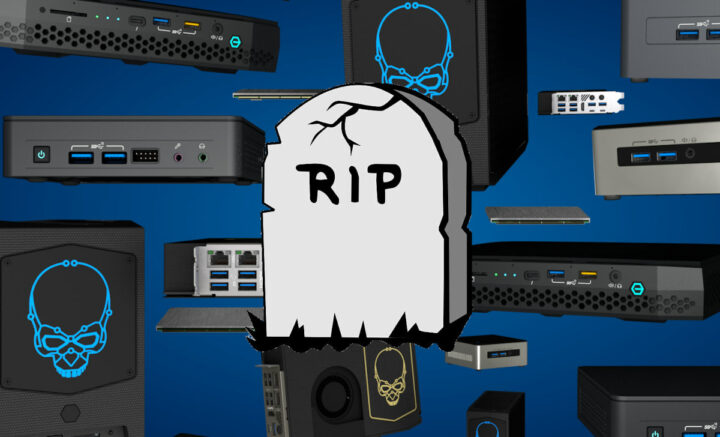Intel has just decided to shut down its Next Unit of Compute (NUC) business selling mini PC, PC, boards, and modules directly to customers, as the company told partners they will stop direct investment into that part of their business.
We first wrote about Intel NUC in 2014, but the company’s first NUC was launched in 2013, and I can only imagine Intel decided to kill the NUC business in order to focus on its core business which is to sell processors. They won’t directly compete against their customers anymore, although it’s unclear if this was part of the decision…
I have mostly read praises about the NUC family over the years, but I’ve had a mixed experience myself. One family member asked for a reliable mini PC, so I recommended a Core-i5 NUC and while it mostly worked fine, we had to purchase a separate USB WiFI dongle as the built-in wireless module would not connect reliably to our router 6 meters away. Its useful life was also much shorter than I expected, and after three years it started to become unreliable either being very slow or crashing, and no OS re-installation would fix that.
But back to the main story that was first reported by ServeTheHome, and later confirmed by other publications such as Engadget and Tom’s Hardware. Intel also reached out to ServerTheHome to confirm the news after its publication:
We have decided to stop direct investment in the Next Unit of Compute (NUC) Business and pivot our strategy to enable our ecosystem partners to continue NUC innovation and growth. This decision will not impact the remainder of Intel’s Client Computing Group (CCG) or Network and Edge Computing (NEX) businesses. Furthermore, we are working with our partners and customers to ensure a smooth transition and fulfillment of all our current commitments – including ongoing support for NUC products currently in market
So the good news is that Intel will keep its current commitments and still support the latest Intel NUC 13 and earlier models, but we won’t see an NUC 14, at least not from Intel. However, other companies may take over as noted by Liliputing, since some companies such as Simply NUC started by selling NUCs from Intel but eventually started to roll their own NUC-like designs. The company issued a statement about the company’s intention to “Double Down on Continued NUC Innovation and Growth” with John Deatherage (SimpyNUC CMO) who previously helped kickstart the NUC business at Intel reaffirming the company’s commitment to “delivering small form factor solutions”. So as Intel kills its NUC business, and others are likely to take over hopefully with help from Intel on the software/driver side, we can probably proclaim “the NUC is dead, long live the NUC!”.

Jean-Luc started CNX Software in 2010 as a part-time endeavor, before quitting his job as a software engineering manager, and starting to write daily news, and reviews full time later in 2011.
Support CNX Software! Donate via cryptocurrencies, become a Patron on Patreon, or purchase goods on Amazon or Aliexpress





